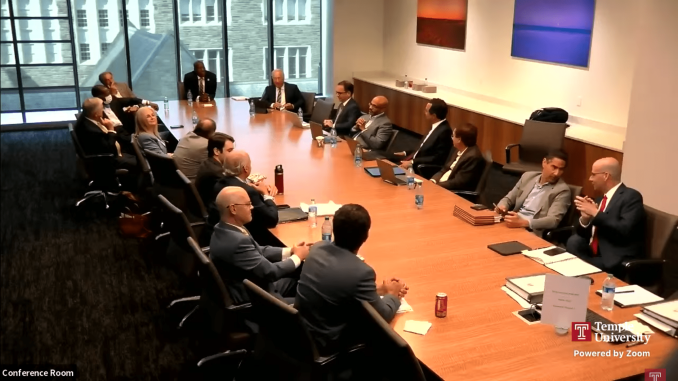
Updated 7/18 at 12:26 p.m.
Temple University’s Board of Trustees approved a 3.6 percent budget cut, increased mandatory fees and hiked tuition for a second consecutive year at their meeting Tuesday afternoon.
The university also imposed the 3.9 percent tuition bump to help counter soaring levels of inflation rising across the country and due to Temple’s stagnant state appropriation which remained at $158.2 million, the same amount as the 2021-22 academic year.
In his opening remarks, President Jason Wingard touted Temple’s COVID-19 pandemic response during the 2021-22 academic year and the university’s ability to hold in-person learning in both fall and spring semesters. Wingard also discussed Temple’s campus safety efforts and gun violence in Philadelphia. Additionally, Wingard highlighted the establishment of the Blue Ribbon Commission on antisemitism, a university initiative that aims to cultivate inclusive spaces for Jewish students and employees on campus.
Here is what else happened at Tuesday afternoon’s meeting:
PROJECTS
The Board of Trustees approved six development-related projects at their meeting Tuesday afternoon.
During this fiscal year, Temple will pursue exterior projects including facade renewals on buildings like the Howard Gittis Student Center and 1810 Liacouras Walk and roof replacements on Weiss and Wachman Hall.
Trustees also approved the continuation of additional phases of campus projects, like Phase 2 of the upgrades to the restrooms in Mazur and Gladfelter Halls and Phase 3 of construction and capital improvements to the Bio-Life Building.
The Board authorized the university to proceed with combining Temple property from 1518 to 1526 North Broad Street with land owned by Goodman Properties at 1528 North Broad Street. The joint properties will then be leased to Landmark Properties to be developed into retail and student housing.
FINANCES
Trustees approved that 4.25 percent of the university’s assets from trusts, endowment funds and quasi-endowments funds be treated as income during fiscal year 2022-23.
The Board also approved Temple University Health System’s capital and operating budgets for the 2022-23 fiscal year. TUHS’ fiscal year 2023 budgeted annual operating revenue is $2.56 billion.
MAJOR GIFTS
Trustees approved a $540,000 endowed fund at the Tyler School of Art and Architecture to support photography majors in good academic standing with financial need and a $200,000 gift to name a gallery within Temple Contemporary, the school’s center for exhibitions and public programs.
Additionally, the Board affirmed a $120,000 pledge from The Beasley Firm, LLC to support the law school’s trial advocacy program.
CLOSING REMARKS
Ken Kaiser, chief operating officer, identified grants and contracts awarded between January 1 and March 31 and Michael Gebhardt, vice president and university secretary, approved the presentation of degrees-in-course from Oct. 29 to candidates approved by faculty academic committees in Tsinghua LLM Program in China.
Faculty Senate President Kimmika Williams-Witherspoon discussed faculty mental health struggles amid the COVID-19 pandemic and gun violence in the city during her closing remarks. She also expressed the Faculty Senate’s concern about Pennsylvania legislators’ desire to block state funding for the University of Pittsburgh, a fellow state-related university, because of Pitt’s fetal tissue research.
In Temple Student Government President Gianni Quattrocchi’s closing remarks, he expressed hope for a “return to normal” from COVID-19 this academic year and said the student body looks forward to homecoming, family week and welcoming the class of 2026.
“TSG is working diligently throughout the summer in preparation for this new semester,” Quattrocchi said. “Planning events, working with our administrative contacts and faculty in coordination, collaboration for this upcoming engagement with the student body and also to promote resources, services and opportunities available to the student body at Temple.”



Be the first to comment